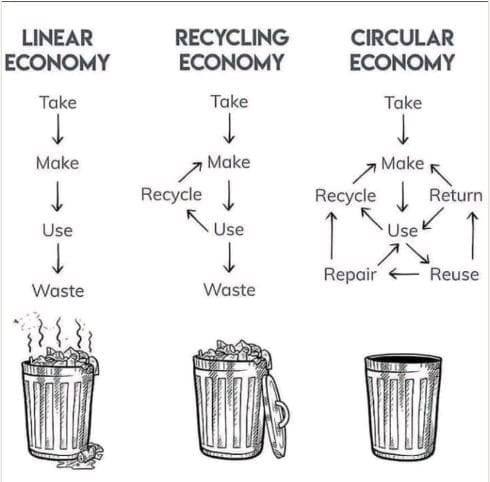All You Need To Know About New Age Education
The Blended Learning: All You Need To Know About New Age Education – Part II
Green Infrastructure
Green, clean, mean campus is the emerging dictum. Overdose of real estate is exactly what is not needed in futuristic campuses. Since the campuses area is supposed to be smart with learning being blended, more can be done in less space and every learner or mentor may not be needed to be present on every working day, while the campuses may work 24×7 with various types of work in different time-slots. This is truer for a university campus with hostels. More than real estate, what campuses need are sustainability-focused measures: productive waste management, biomass and solar power harnessed, more open and transparent premises with glass buildings and rooms with large windows, abundant presence of trees, water bodies, and walking or cycling routes, along with battery driven golf carts or EV cars. Multiple use of rooms, labs, studios and open spaces can be planned strategically and the campus can be used in at least two shifts totalling at least 14 to 16 hours. Circular economy principles with zero waste must be the sine qua non of waste management. UN SDGs (Sustainable Development Goals) must guide the evolution of green campuses which may then be formally recognized so under international standards.

Inter-disciplinary Education:
Far from a singularly focussed approach and a niche specialization, the world of higher education has now understood the value of inter-disciplinary and trans-disciplinary education, beginning with a broad base of multi-dimensional learning, but ending with a focused area of expertise.
All programs need to have a blend of Major and Minor subjects or courses, where the Minor can be from a subsidiary area, or a choice by heart, of at least 20 credits, whereas the major area is the desired focused discipline of learning. A major in Computer Engineering may have a minor in Cyber Law or even Digital Art. A major in Biotechnology may have a minor in Technology Management or even Music.
Then, there should be some common courses of at least 2 credits each for all learners in higher education, irrespective of their domains. These can be courses of Design Thinking (design based solutions), Employability 360 (to enhance the all-round suitability of the talent being groomed for the job market or for entrepreneurship), Art of Living (that focused on values, life and spiritual skills, compassion and empathy through games, exposure, talks and assignments), and surely basic fourth industrial revolution technology skills for all. These need to be introduced with an eye towards the final domain a learner is opting for his/her higher education, and not to make all merely technocrats.
Our South Asian school education is faulty from the perspective that it has very little to do with money matters. So, all learners at the inception of higher education must essentially be introduced to concepts and applications of financial literacy and financial inclusion, entrepreneurship and an innovative mind-set, and the basics and variety of savings and investment options available to all citizens. They must learn how to their make their saved money grow even when they sleep.
It goes without saying that no major success today in any field, and especially that which involves people relations, can be achieved without a good quality of communication, languages & creative skills, the learning of which must also be institutionalized as an essential part of higher education, irrespective of specialization.
Finally, every learner, irrespective of his or her professional expertise, must have basic knowledge of Legal Literacy, human rights knowledge & gender sensitivity to develop an active and positive citizenship ahead in life.
Organic Learning
What we learn as an integral part of the given syllabus at any level of education for which we have to give an assessment leading to a specific qualification is called structured learning. What we learn as a part of our interest, through deep dive self-study and practice, is known as organic learning. True learning is organic.
To institutionalize organic learning within higher education system, the learners must be allowed to choose one course for self-learning during the program, with mentorship organized. They will then resort to deep dive online learning courses in a chosen area and project-based learning with one project for full year, pursuing that project from the area of organic learning. The learners must be supported to develop an industry network based on organic learning area. Also the university must support the creation of organic learning-based work-portfolio of each learner within some parameters. Finally, one Internship or live work in the area of organic learning can be done to stabilize the learning outcome.
A media student may have organic learning in fashion photography, or a law student in environment law, or a biotechnology student in pharmaceutics, or a business management student in the field of forests or temple management.
Scholarships
To support education of those with limited means and those with demonstrated merit, scholarships are today an integral part of higher education. These must be pursued full throttle by the university administration and publicised well for the learners to know and apply for them suitably. With rising cost of quality education, and limited resources and budget in public education, scholarships are a must today.
The various types of scholarships can be:
- Chairman’s Scholarship (full free) for topper in each semester
- Vice Chancellor’s Scholarship (75% free) for second rank-holder
- Dean’s Scholarships (50% free) for third rank-holder & one for outstanding contribution to the department
- Corporate Scholarships (each company to support 50% costs of 1 to 5 learners from their domain)
- Government Scholarships (as per norms)
- Sports Scholarships (25% for provincial level, 50% for national level, and 75% for international level awards)
- International Scholarships (for foreign learners)
- Work-based Scholarships (fees paid against work)
- Endowment Scholarships
- Global Scholarships (like Erasmus Mundus, European Union, Fulbright, Commonwealth, etc)
- Any eminent citizen sponsored scholarships
- Chamber, NGO or any Association sponsored scholarships
Skills Training
Skills are an essential outcome of any higher education. Qualification without skills attained is like a thinking mind without limbs to work with.
Skills can be different:
- Hard skills focus on the knowledge of the core domain and ways and means of practising the knowledge gained including technical and technological skills.
- Soft skills focus on behavioural aspects, team-work and leadership skills, communication skills, personality traits and the way one conducts oneself.
- Emotional skills refer to emotional intelligence to deal with any situation with poise and empathy, tough resolve and compassion.
- Life skills are those which can hold someone in good stead in the long run, whether they are about dealing with crises and challenges, resilience, compassion, taking success and failures calmly with long-term focus on goals, etc.
- Spiritual skills are those that make a person look beyond the moment, beyond momentary barriers, even beyond life, and make them conduct their life ethically and with strong values.
The university can support all of these in some measures and the top three in great measures. The university should have credited courses on Employability 360 skills for better placements & 4IR skills for all to acquire better techno-savviness. Ideally 60% academic evaluation should be on practical, applied and analytical work learnt and done with evidences which can inspire the learners to focus less on memory based old school education and more on analysis and application based learning. There should be workshops and courses to develop a combination of soft skills, hard skills & life skills in each learner. Art of Living course can develop life and spiritual skills for the long run. Surely leadership & teamwork skills can be nurtured through club activities and outdoor initiatives (which need to be documented and assessed). Stress Management skills to deal with work pressures and crises make another area of focus that the university can support the learners with.
To ensure right skills for each learner so that there is no square peg in a round hole, there need to be deep dive psychometric tests to identify skills-set needed at the start of the course and evaluate the skills learnt by the time a learner is completing the program.
Multi Assessment
Examination has been traditionally a dreaded word that reminds one of failures and punishments, stress and crises. Evaluation or assessment is much more positive that makes someone challenge oneself with a positive mind-set.
Today assessment is multi-dimensional and multi-spatial, not just a mega written examination at the end of a course or semester or year which was often the sole yardstick to falsely judge the brilliance of a learner.
Assessment has to be continuous and through various means. First, Diagnostic Assessment through quiz, situational analysis, applied thinking that should be done at the start of a course, which allows the mentor to assess where each learner stands in his/her learning journey.
Formative Assessment can be done through debates, case-studies, syllabus presentation, lab and studio-based work or experiments, mid-course assignment, mid-semester written test, etc. This needs to be continuous and done throughout the course, with one credited or marked assessment in each fortnight.
Finally, Summative Assessment is done through a project-based work, major course-ending assignment with an outcome, and a written examination, all of which can come at the end of the course.
Apart from this academic evaluation, one should be assessed on multiple other parameters going beyond academics, which was discussed earlier.
Part II ends….




